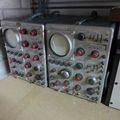547: Difference between revisions
m (Inside Pic) |
No edit summary |
||
| Line 119: | Line 119: | ||
Tek_547_Delayed_Trig.jpg | 547 Delayed Trace | Tek_547_Delayed_Trig.jpg | 547 Delayed Trace | ||
Tek_547_Transformer.jpg | 547 LV Transformer Connections | Tek_547_Transformer.jpg | 547 LV Transformer Connections | ||
Tunnel_DIode_1D2_2.2mA.jpg | 2. | Tunnel_DIode_1D2_2.2mA.jpg | 2.2 mA Tunnel Diode in 547 Delay Pickoff | ||
Tek_547_Inside_Tubes.jpg | Inside a Tek 547 | Tek_547_Inside_Tubes.jpg | Inside a Tek 547 | ||
</gallery> | </gallery> | ||
[[Category:500 series scopes]] | [[Category:500 series scopes]] | ||
Revision as of 06:15, 2 July 2018
The Tektronix 547 is a 50 MHz scope that takes letter-series and 1-series plug-ins. It has two identical timebases and, when used with the 1A1, 1A2, or 1A4, has the ability to display one input with one time scale and another input with a different time scale. The effect is similar to a dual-beam scope assuming that the input signals are repetitive. This "Sweep Switching" feature differentiates the 547 from the 546.
There is also a rackmount version, the RM547 or R547.
The project lead for the development of the Tektronix 544, 546, and 547 was Bob Rullman.
Internals
Triggering
Triggering is done with tunnel diodes. The 'A' trigger is based on a 10 mA tunnel diode. Up to serial number 11889, it uses a TD253. From 11890 onward, it uses a 152-0140-01.
CRT
The 547 uses the Tektronix 154-0478-00 CRT.
HV Transformer
A common problem with 547s is the HV transformer. Rather than potting the HV transformer in wax, as was done up to that point, the 547's HV transformer was potted in epoxy. Unfortunately, this epoxy turned out to absorb moisture over time, particularly when used in humid climates. The moisture causes increased losses in the transformer. Excessive losses require the regulator to drive the 6AU5 input oscillator tube (V800) harder. Eventually, the drive circuit cannot supply enough power to keep the supply in regulation. The usual solution is to scavenge a replacement transformer from another scope. As a labor of love, hobbyists have been known to rebuild the HV transformers. This is discussed from time to time on the Yahoo TekScopes forum.
Vertical Amplifier
The 547 has a five-stage BJT vertical amplifier that is fully differential from the plug-in connector to the CRT vertical deflection plates. There is one tube in the vertical signal path, a 12AT7 acting as a unity-gain buffer between the plug-in connector and the vertical amplifier.
There is a 170 nanosecond delay line between the first and second gain stages.
Power Supply
Power Supply
The 547's power supply provides regulated outputs of −150 V, +100 V, +225 V, +350 V, as well as a +325 V unregulated output for CRT HV section.
Multiple secondary windings feeds diodes for rectification for different voltages. Both center-tap and bridge configuration is used. Its a all Tube design for the regulation. There are multiple 6.3V secondary outputs for heaters, many elevated to different voltage levels based on the section/tube its used for to keep the Heater-Cathode voltage level within limits.
As is common in many Tektronix scopes, all regulated voltages are referred to the negative regulated rail (−150 V in this case) by fixed low-tolerance dividers. Only the −150 V voltage is trimmed, its reference is a OG3 VR tube. A 12AX7 is used as the comparator, two 6CW5 in parallel are used as series pass tubes. A 6AU6 is used as an error amplifier.
Most other stages replicate the same design, except slight changes in tubes used − the , +225 V and +100 V regulators employ a 6080 as the pass element, +350 uses a 6CW5 - and reference for them is the -150V
The plate voltage delay circuit is as like in may other Teks, uses a 6N030 delay tube (P/N 148-0021-00) to control a relay that switches plate supply voltages on only after the tubes are warmed up. Heater voltage is directly applied to tubes on Power on.
Links
- Tek 547 in "Reading Jim Williams" blog: Scope Sunday 13 and Vintage Scopes are Better, pt.1
- "MightyOhm" blog: Jim Williams workbench
- Comparing an Apollo Era Workhorse to Today’s Bench Scope @ tek.com
- Eiki Martinson: Tektronix 547 Oscilloscope—Getting an Old Soldier Back in the Fight
- Tek 547 page @ amplifier.cd
- The Tektronix 547 Oscilloscope - Magic in the Box
- J.Evans's 547 page
Pictures
-
-
Front view
-
Top
-
Right
-
Left
-
Vertical amplifier
-
Trigger A
-
RM547
-
-
-
-
-
-
Gray 547
-
-
-
-
547 serial "ENG B 23"
-
547 serial "ENG B 23"
-
rear connections
-
Tek 547 Vertical Amplifier
-
Tek 547 CRT
-
Tek 547 CRT Side View
-
Tek 547 CRT Deflection Plates & Assembly
-
Tek 547 CRT Electron Gun Assembly
-
Tek 547 Underside of Chassis. Main Transformer is Not Present.
-
Tek 547 Chassis Without CRT and Plug in
-
Tek 547 Screen Scale
-
Tek 547 Top
-
Tek 547 HV Section and 5642HV Rectifier Tube (Cover removed)
-
Tek 547 Main Transformer
-
Tek 547 Main Transformer
-
Tek 547 Main Transformer
-
Tek 547 Inside view with Power ON
-
Tunnel Diodes TD253 and TD3A in a Tek 547 Trigger and Sweep Section)
-
547 with 1A2 in ALT Sweep Mode
-
547 Delayed Trace
-
547 LV Transformer Connections
-
2.2 mA Tunnel Diode in 547 Delay Pickoff
-
Inside a Tek 547








































